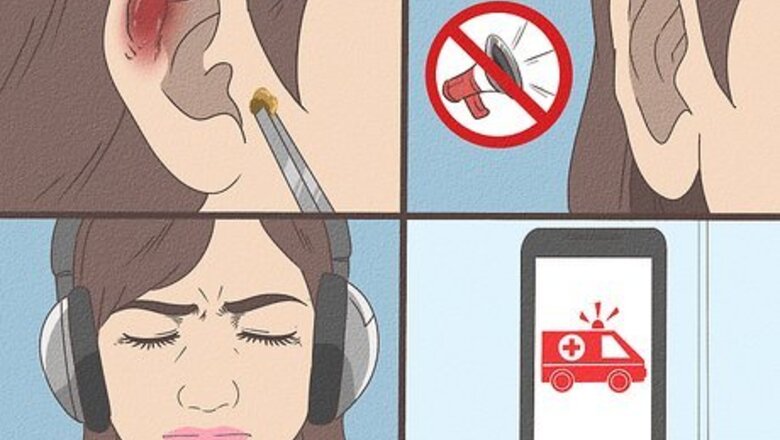
views
Is sleeping with headphones safe?
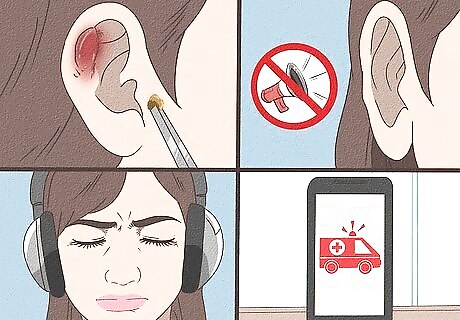
For the most part, yes, but there are some risks to be aware of. While all these risks can be managed by using properly-fitting headphones and keeping the volume at a moderate level, it’s a good idea to be aware of them. If you want to take a break from using headphones while sleeping and you’re not worried about disturbing other people, you can always use an external speaker. Some potential problems from sleeping with headphones include: Earwax build-up: Earbuds block the natural movement of wax outside the ear, so it’s best not to wear them too long, or wear over-the-ear headphones if you’re concerned about this. Hearing loss: Listening to loud music for prolonged periods of time can damage your hearing. Try to limit your volume to 60% of its maximum to prevent hearing loss. Pressure headaches: Some people may experience headaches with tight-fitting headphones that place pressure on their skull. Using a more comfortable pair can limit these symptoms. Necrosis: Ill-fitting headphones can damage the skin in your ear canal over time, which happens when there’s not enough blood flow to keep cells alive. Looser headphones can prevent this from happening. Missing emergencies: Noise-cancelling headphones can keep you from hearing important calls, alarms, or warnings about emergencies.
Best Picks for Sleep-Friendly Headphones
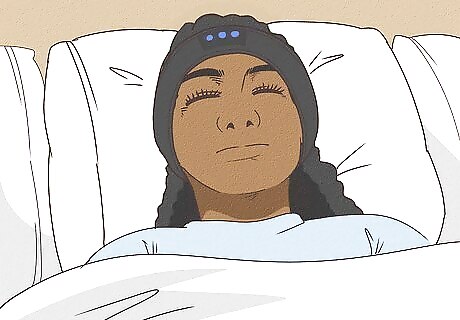
We’ve done the research: here are our top picks for products that will get you a good night’s rest while listening to your favorite tunes. Best headband headphones: HoomBand Wireless Best budget headband headphones: MUSICOZY Sleep Headphones Best low-profile earbuds: Damipow True Wireless Sleep Earbuds Best budget low-profile earbuds: Hearprotek Sleep Earbuds Best pillow: M.B. Leaf Pillow with Ear Hole
Best Headband Headphones
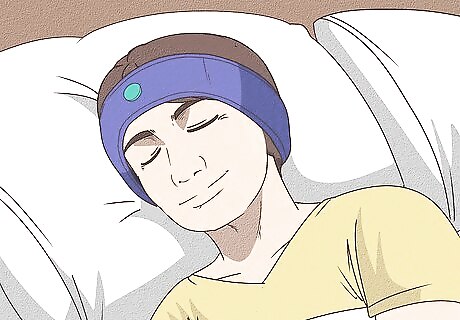
HoomBand Wireless While normal headphones can be uncomfortable or end up damaged by sleeping on them, headband headphones are specially designed to withstand this pressure. The HoomBand Wireless headband is our top pick because, on top of an exceptionally comfortable design, it also offers a bundle of extra benefits, including access to hypnotic sleep content crafted by experts to help you fight off insomnia. With 10 hours of playtime, a single charge can last you all night. Cons: Sizing can be an issue, so be sure to measure the circumference of your head before you buy.
Best Budget Headband Headphones
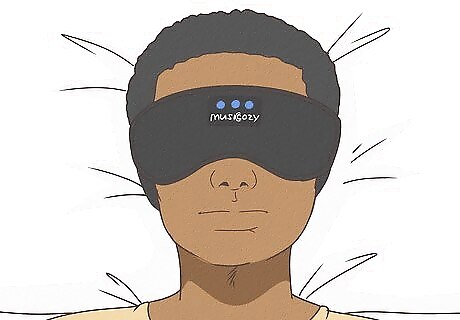
MUSICOZY Sleep Headphones For a more affordable headband headphone that doesn’t sacrifice comfort, our pick goes to MUSICOZY Sleep Headphones. These headphones will last on a full charge for 10 hours, and come with impressive sound quality. They also come in several different colors, so you can pick a style that works best for you. Cons: While the padding on the ears doesn’t protrude too much, these headphones might be a bit uncomfortable for dedicated side-sleepers who wake up easily.
Best Low-Profile Earbuds
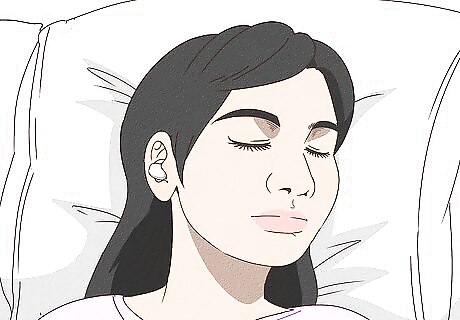
Damipow True Wireless Sleep Earbuds Earbuds that stick out of your ear can make side-sleeping quite uncomfortable. The Damipow True Wireless Sleep Earbuds solve this issue by fitting close to your ear, and come with several different sizes for earbud caps so that you can pick the one that feels best. These earbuds are totally wireless, which means you won’t be fussing with cords in your sleep, block outside noise, and have great sound quality. Cons: These earbuds only have a battery life of around 5 hours. Although charging them is easy (only taking a couple hours at most), they likely won’t last the whole night without getting plugged in. Matthew Walker Matthew Walker, Neuroscientist and Sleep Expert Sleeping with headphones has pros and cons. The right sounds like white noise or soothing music can promote relaxation and faster sleep. But there are safety issues to consider too — loud volumes may damage hearing over time or prevent you from hearing alarms. Finding balance allows you to get the sleep benefits without compromising ear health or safety. Use sleep-specific headphones that are comfy and safe for all-night wear. Keep volume low. With some precautions, headphones can be a helpful sleep aid.
Best Budget Low-Profile Earbuds
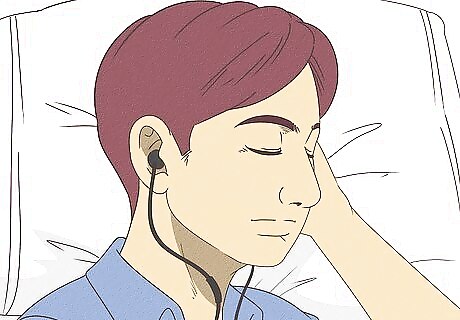
Hearprotek Sleep Earbuds. The Hearprotek Sleep Earbuds do a great job of blocking out noise and are designed to be comfortable even when sleeping on your side. Best of all, they do it without breaking the bank. Since they’re made out of silicone (not plastic), they’re soft and don’t end up digging into your ear. Cons: These are wired earbuds, which means that you might end up getting your sleep interrupted by cords. On the plus side, this means that they won’t run out of battery.
Best Pillow
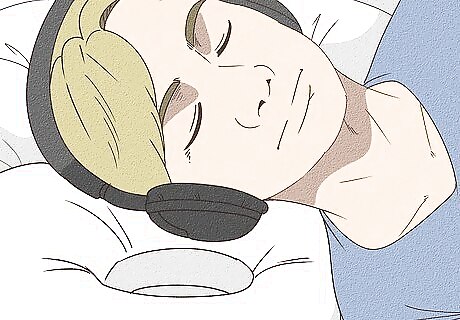
M.B. Leaf Pillow with Ear Hole For side sleepers, there’s nothing worse than having a headphone or earbud jut into your ear when you’re trying to relax. The M.B. Leaf Pillow with Ear Hole is designed for people who are dealing with ear pain, whether from headphones, a piercing, or tinnitus. It’s made out of high-density memory foam and comes with specially designed pillow cases. Cons: Memory foam pillows are known for their comfort, but this high-density type can be a bit too hard for some sleepers. If you enjoy firm pillows, don’t hesitate to check this one out.
What are the benefits of sleeping with headphones?
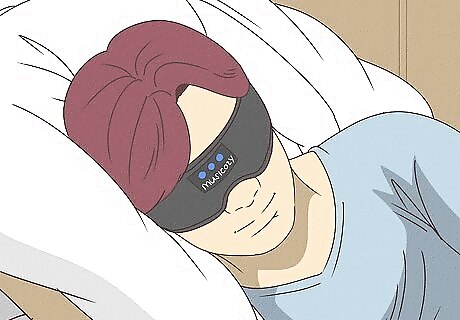
Calmer sleep: There have been several studies on the effect of music on sleep that show that listening to music that relaxes you can lead you to feel more well-rested. If you’re experiencing insomnia, listening to music may be able to help you fall and stay asleep. Listening to music that mimics your heart rate, somewhere between 60-80 beats per minute, can be especially calming. Calculate the BPM of your favorite songs to make a relaxing bedtime playlist.
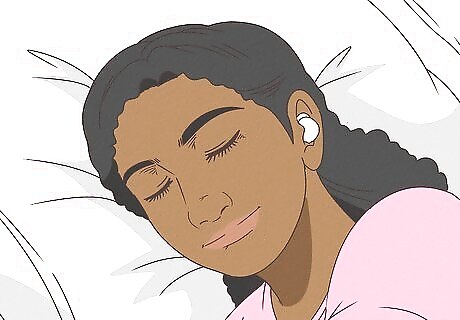
Improved mood: Listening to music or a podcast you enjoy stimulates the production of serotonin, a chemical that makes you feel good. For people who experience depression, listening to music as you sleep can help your mood at night.
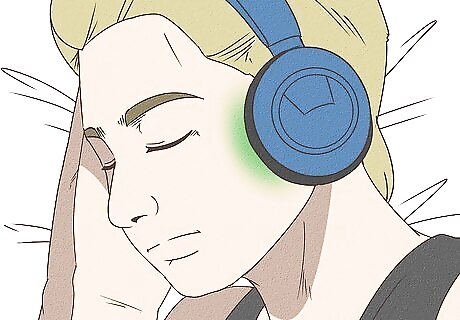
Tinnitus relief: If you’re someone who experiences tinnitus, or a constant buzzing or ringing sound in your ears, listing to music or a podcast at night can give you some relief. There are also specialized music therapies that remove certain irritating frequencies from sound, which can also help alleviate your symptoms. If your tinnitus is caused by prolonged exposure to high-intensity noise, be sure to talk to your doctor before deciding to sleep with headphones. You may end up irritating your ears further. If you’re interested in music therapy for tinnitus, talk to an ENT doctor for more advice.




















Comments
0 comment